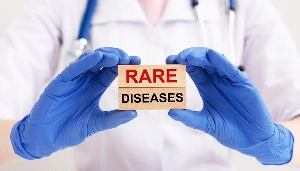 Some of the cases diagnosed are the first to be found in Africa
Some of the cases diagnosed are the first to be found in Africa
The Greater Accra Regional Hospital has tested and diagnosed 50 children with rare diseases in the country.
Yvonne Brew, a paediatrician at Ridge Hospital, said that some of the children diagnosed were the first to be found with those conditions in Africa.
This has provided immense relief to healthcare workers and their families, who now understand what these children are going through.
Dr Brew stated this during a lighting-up event hosted by the Rare Disease Ghana Initiative to commemorate 2024 World Rare Disease Day.
Rare diseases are defined as any condition that clinicians are unable to diagnose early, affect only a handful of the general population, and have a wide range of symptoms.
Rare Disease Day is observed annually on the last day of February to raise awareness of rare diseases and their impact on individuals and their families.
It sheds light on the impact of rare diseases, especially rare infectious diseases, with an emphasis on early detection and treatment access, as well as the struggles of those living with rare conditions and advocating for their rights.
In many cases, these diseases are chronic, progressive, debilitating, and life-threatening, posing significant medical, social, and economic burdens on patients and their families.
Dr Brew explained that nearly 70 per cent of rare diseases start in childhood, making early diagnosis and treatment critical for patients.
She said diagnosing children with rare diseases could prove challenging, but the Rare Disease Ghana Initiative has tested and diagnosed babies and a few older ones with disorders that health experts were unaware of.
"With this, we can now have a management plan for these children and the first to know what to expect in the mother's next pregnancy," she added.
Dr Brew said that the Rare Disease Ghana Initiative had played a significant role in the clinical work at Ridge Hospital and that they hoped to carry out more tests on children for early diagnosis in the coming years.
Mr Samuel Adjei-Wiafi, Executive Director of the Rare Disease Ghana Initiative, said that the Ridge Hospital's symbolic lighting-up event was meant to raise awareness and support for the about 300 million people worldwide who suffer from rare diseases.
He said Ghana joined the rest of the world in 2018 to commemorate the day, making it the seventh time Ghana had observed it.
Mr Adjei-Wiafi urged everyone, including policymakers, the public, clinicians, researchers, and the community, to work together to ensure that the needs and interests of people living with rare diseases are addressed.
He also called for a national policy on rare diseases that would allow for intentional training of healthcare professionals to treat such conditions, enhanced infrastructure to improve diagnosis, and the incorporation of genetic services into the health system.
The Executive Director also advocated for screening at birth to guarantee that newborns with these disorders are identified promptly to prevent potential complications, adding that rare disease treatment should be included on the essential medicine list in the National Health Insurance.
He said that the Rare Disease Ghana Initiative database has now recorded over 200 individual families with different forms of rare diseases.
"There are about 7,000 lists of Rare Diseases globally and Ghana has recorded almost 200 of such diseases.
“This is evident that rare diseases exist in Ghana and the needed action has to be taken to know how to protect their health in society," he added.
Dr Ralph Armah, Head of Clinical Services, Ridge Hospital, speaking on the significance of the day, said the hospital was happy to partner with the Rare Disease Ghana Initiative to create awareness.
He explained that most rare diseases were hereditary and urged the public not to associate spiritual implications with such conditions to prevent stigma.